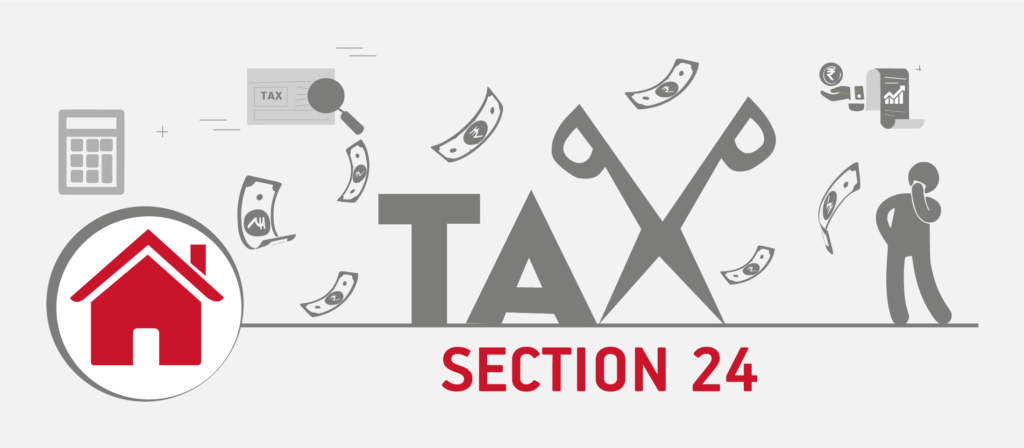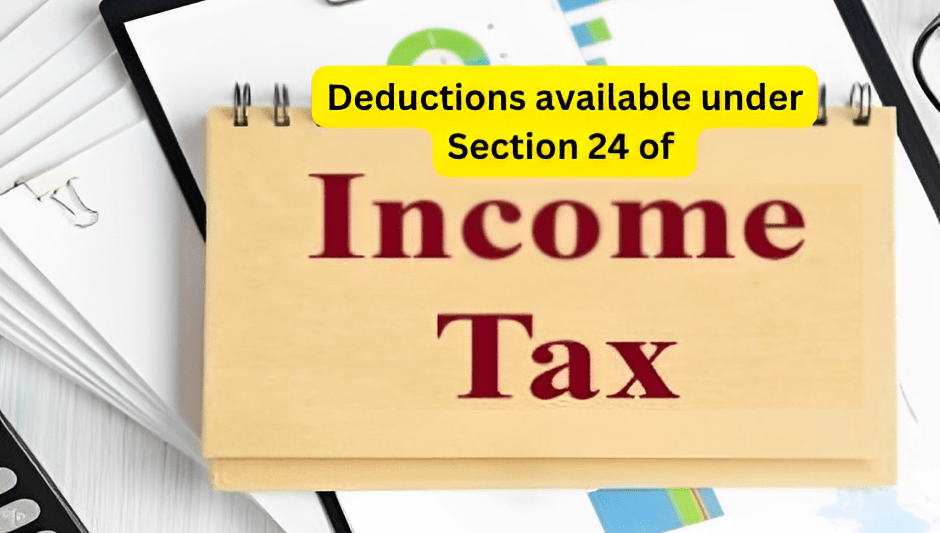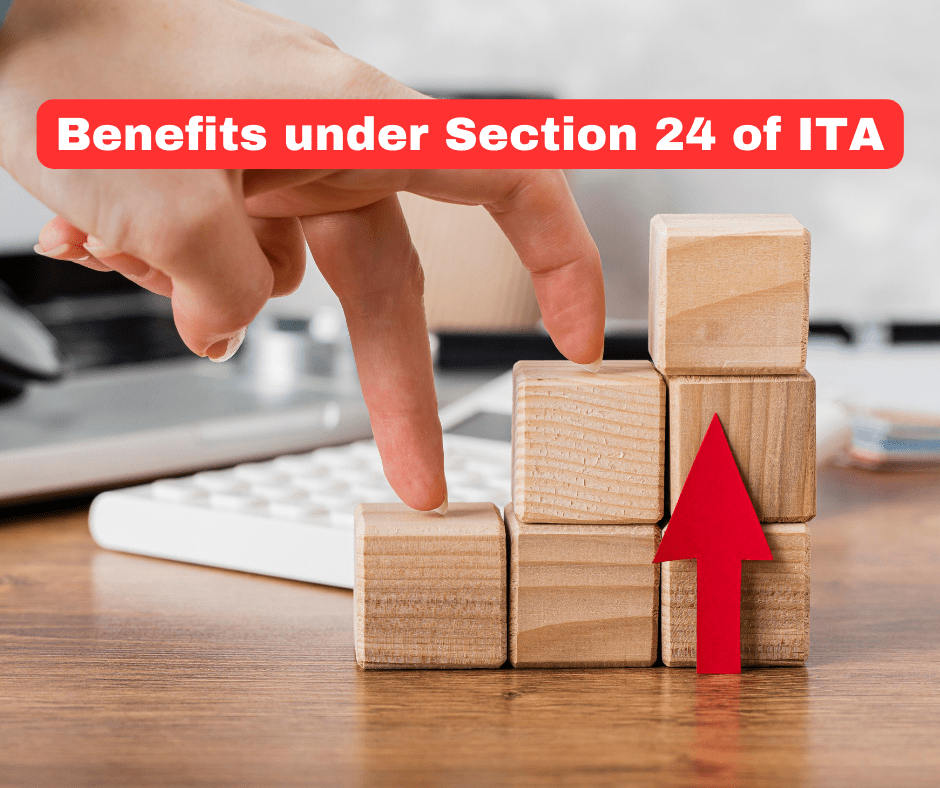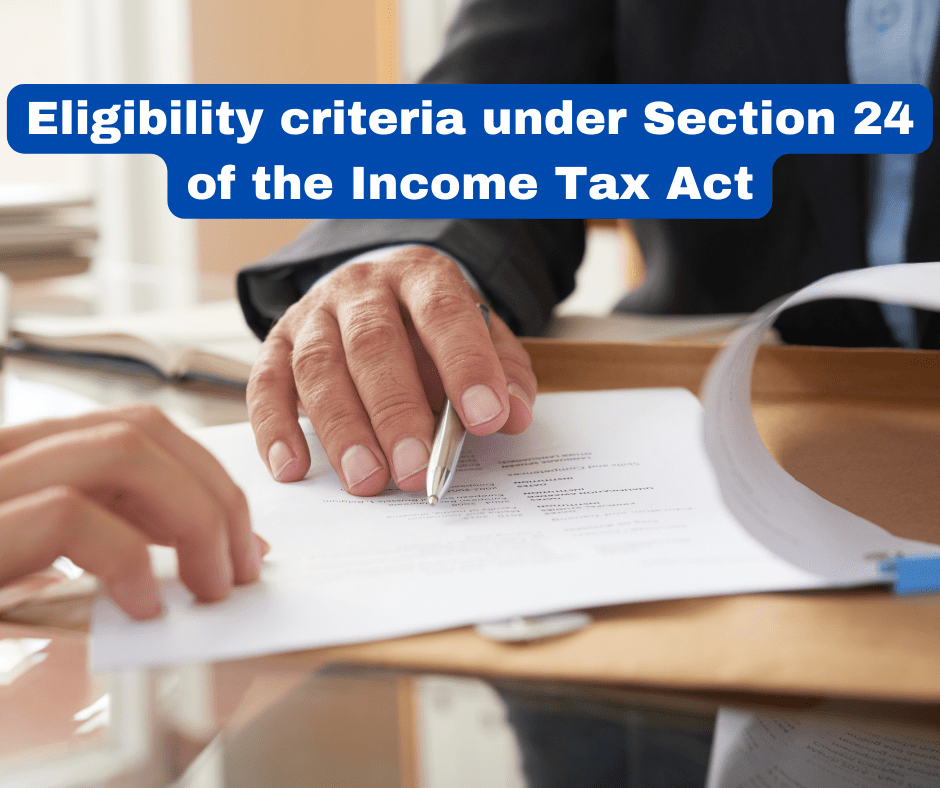
A Simplified Guide to Section 24 of the Income Tax Act
The Income Tax Act (ITA) serves as a set of rules that governs taxation systems within a country. It encompasses provisions and regulations that aid in calculating the income of individuals and entities. Within this framework, Section 24 of the Income Tax Act holds significance as it addresses deductions concerning the income of individuals. In this blog, we aim to offer a simplified explanation of Section 24 of the Income Tax Act. By delving into its definition, objectives, available deductions, advantages, eligibility criteria, key pitfalls to avoid, and pertinent updates and revisions, we hope to provide you with a simplified guide.

What is Section 24 of the Income Tax Act?
In India, Section 24 of the Income Tax Act, commonly known as ITA, is a provision that individuals can utilize to claim deductions on the interest paid for a home loan or any borrowed capital used for acquiring, constructing, repairing, or renovating a house property. This provision serves as a measure for taxpayers as it effectively reduces their income and subsequently decreases their overall tax liability.
In essence, Section 24 precisely outlines the conditions and circumstances under which individuals are eligible to claim deductions on the interest component of their home loan. It is important to note that this provision solely pertains to the interest paid and does not cover the repayment portion of the loan.
The underlying objective of Section 24 is to offer relief and support to individuals who have availed themselves of a loan to acquire or construct a house property. By facilitating deductions, on the interest paid, the government intends to promote homeownership and foster growth in the real estate sector.

Facts to consider while implementing Section 24 of the Income Tax Act
When implementing Section 24 of the Income Tax Act (ITA) it is imperative to consider aspects. These facts play a role in ensuring compliance with the provisions and maximizing the benefits offered by Section 24. Here are some key facts to keep in mind:
Loan Purpose:
The loan must be obtained to acquire, construct, repair, or renovate a property. It is vital to ensure that the loan funds are utilized exclusively for these purposes to qualify for deductions under Section 24. Utilizing the loan for purposes such as expenses or investments may result in the disqualification of deductions.
Property Ownership:
The taxpayer must be the owner of the property against which the loan is secured. It is essential to verify that the property is registered in the taxpayer’s name or jointly owned if claiming deductions as a co-owner. Maintaining evidence of ownership such as property documents and registration papers, is necessary for verification purposes.
Completion Status:
To claim deductions under Section 24 the construction of the property must be fully completed and possession should be acquired. This means that the taxpayer should have the right to occupy and utilize the property.
Loan Documentation:
Proper documentation regarding the home loan is important. This comprises loan agreements, repayment schedules, interest certificates, and receipts. These documents serve as proof of the loan obtained, interest paid, and other relevant details. Maintaining documentation is crucial to support claims made under Section 24 and for future tax assessments or audits.
Interest Calculation:
When calculating the deduction under Section 24, only the interest portion of the loan is eligible, not the repayment. It is vital to calculate the interest paid during the year accurately to claim the deduction. The calculation should take into account factors such as the interest rate, loan amount, and repayment schedule. Any errors or inaccuracies in interest calculations can lead to deductions and potential tax complications.
Loan from a recognized institution:
To be eligible for deductions under Section 24, the loan must be obtained from a recognized institution. It is important to ensure that the lender is authorized by bodies and compliant with laws and regulations. Loans obtained from family members, friends, or unregistered lenders may not qualify for deductions under Section 24. By taking into account these points when implementing Section 24 of the ITA, people can make certain they fulfill the criteria and receive deductions on the interest they pay for their home loans.
It is recommended to consult with a tax expert or seek guidance to grasp the particulars and consequences of Section 24 according to their circumstances.
By paying attention to these facts while implementing Section 24 of the ITA individuals can ensure adherence, to regulations. Make the most of their entitlements under this section. If the construction is still, in progress or if the possession of the property has not been taken deductions may not be permitted until the completion and possession requirements are fulfilled.

Deductions available under Section 24 of the Income Tax Act
Under Section 24 of the Income Tax Act there are deductions, for various categories:
Self-employed Individuals:
If you are self-employed you can claim a deduction for the interest paid on a home loan as a business expense. The entire interest amount is eligible for deduction. However, it’s important to keep in mind that the loan should be used to acquire, construct, repair, or renovate a property that is used for your business or profession.
Homeowners (excluding self-employed):
Homeowners who are not self-employed can also claim deductions on the interest paid on a home loan. The maximum deduction allowed is up to Rs. 2 lakhs per year. It’s crucial to note that the loan should be utilized for acquiring, constructing, repairing, or renovating a property and the property should be owned and occupied by you as the taxpayer.
Salaried Employees:
Salaried employees are also eligible to claim deductions on the interest paid on a home loan. Similar to homeowners, the maximum deduction allowed is up to Rs. 2 lakh, per year regardless of the interest amount paid. It is crucial to consider points when seeking a loan, to acquire, construct, repair, or renovate a residential property while ensuring that the property in question is both owned and occupied by the taxpayer.
Therefore, deductions granted under Section 24 are exclusively applicable to the interest component of the home loan and not the principal repayment portion. It is essential to source the loan from a recognized institution and maintain documentation to substantiate any claims made.
It is important to remember that the precise details and eligibility criteria may differ depending on an individual’s circumstances. Hence seeking guidance from a tax professional or referring to the Income Tax Act is highly recommended. This will ensure you have access to personalized information regarding the deductions under Section 24.

Benefits under Section 24 of ITA
Section 24 of the Income Tax Act, in India offers a range of advantages to taxpayers to ease their tax burden and encourage homeownership. Here we curated in detail the benefits that individuals can avail of under Section 24:
Reduction in taxable income:
One of the advantages offered by Section 24 is the decrease, in income. When it comes to home loans the interest paid is regarded as an expense. Can be claimed as a deduction. By subtracting the interest amount from the income the taxable income is reduced, ultimately leading to a decreased tax liability, for the taxpayer.
Financial Relief:
For people who have availed of a home loan the deduction, on the interest paid offers a needed respite. Home loans often come with interest obligations and the provision outlined in Section 24 serves to alleviate this burden. The resulting tax savings can be quite substantial for individuals, with loan amounts and extended repayment periods.
Encouragement for ownership:
Section 24 is incredibly significant when it comes to encouraging homeownership in India. Its purpose is to offer deductions, on the interest portion of home loans, which serves as an incentive for individuals to consider investing in properties. The government’s objective, behind this initiative is to stimulate the real estate sector ultimately fostering growth.
Ensuring Consistency, in EMI Outflow:
Home loans typically consist of equated installments (EMIs) that encompass both the principal and interest portions. Section 24 provides a deduction that alleviates the tax burden consequently contributing to the stability of EMI payments. This deduction effectively reduces individuals’ tax liability granting them greater disposable income to effectively manage their loan repayments.
Achieving Long-Term Savings:
Embracing the advantages offered by Section 24 can yield long-term savings. By reducing income individuals can enjoy lowered tax payments throughout their loan. As time passes these accumulated savings can grow substantially granting individuals flexibility, for various endeavors like investments, retirement planning, or fulfilling other important monetary aspirations.
Co-ownership Advantages:
In cases where individuals co-own a property, they can individually avail deductions, on the interest paid based on their ownership shares. Let’s consider a scenario where two individuals jointly own a property and have secured a home loan. In this scenario, each co-owner is eligible to claim deductions, on the interest paid corresponding to their portion of ownership. Consequently, this strategy enables them to maximize the benefits offered under Section 24.

Eligibility criteria under Section 24 of ITA
To meet the eligibility criteria specified in Section 24 of the Income Tax Act (ITA) individuals must satisfy the following conditions:
Purpose of Loan: The loan must be obtained to acquire, construct, repair, or renovate a property.
Property Completion: It is essential that the construction of the property is fully completed and the individual has taken possession of it.
Loan, from Recognized Financial Institution: The loan should be procured from an institution that is recognized by the relevant authorities. Also, it’s important to maintain documentation about the loan.
By avoiding these common mistakes, individuals can ensure accurate claims for deductions under Section 24 of the Income Tax Act.
Key Takeaways:-
Section 24 of the Income Tax Act offers taxpayers the chance to reduce their tax burden by claiming deductions on the interest they pay on home loans. This provision is significant in promoting homeownership and aiding individuals in managing their tax liabilities. By gaining an understanding of the definition, objectives, available deductions, advantages, eligibility requirements, and potential pitfalls to avoid within Section 24, taxpayers can optimize their benefits while adhering to the Income Tax Act. It is advisable to seek guidance from a tax expert for advice and to stay informed about any modifications to tax regulations.
To not miss out on huge savings and seamlessly get your tax return filed, check this out!
Contact us today to know how we can help you.
Individuals should avoid the following common mistakes while claiming deductions under Section 24 of ITA:

